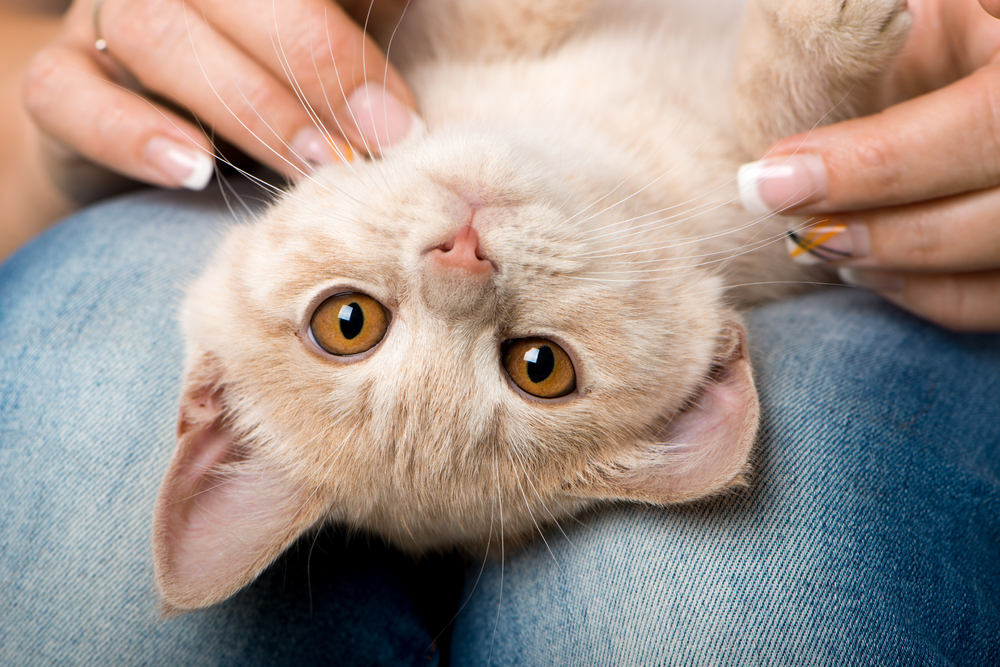Friendly Felines: Cats Like People (Really!), Study Says

Do cats like being around people, or are they only using humans to open doors and operate can openers? A new study suggests that human contact is more important to cats than previously suspected (though, arguably, cat owners knew that all along).
While it is commonly accepted that dogs enjoy and seek the company and attention of people, there is less of a consensus about felines. Cats — which typically need more sleep and less daily maintenance than dogs — have earned a reputation (particularly among dog lovers) for being standoffish and nonchalant, and less interested in the affection and approval of people than canine pets are.
However, when researchers investigated cats' preferences for food, toys and social interaction with people, most of the cats sought human attention over everything else — even food. In other words, cats like us! They really like us! [6 Secrets to Unlocking Your Cat's Personality]
The study originated at Oregon State University's Human-Animal Interaction (HAI) lab. Prior research had explored cats' preferences for food, visual stimuli and scents, evaluating the impact these could have on the animals' behavior. But this new study was the first to also investigate cats' interactions with humans as a behavior that could affect the felines' quality of life, the authors said.
Scientists tested groups of adult cats between the ages of 1 and 20, gathering results from 19 cats that were living in shelters and 19 cats living with owners. For 2 hours and 30 minutes prior to the tests, the cats were isolated from social attention and food. They were then introduced one at a time to different stimuli, provided in separate sessions.
In one session, a person offered the cats vocal calls, petting and a chance to play. In another, the cats had free access to food, a toy mouse with a shaker inside, or cloths marked with the scents of catnip, another cat and a gerbil.
During the sessions, the researchers noted how engaged the cats were and how much time the animals devoted to the different activities. However, the final test offered the cats all of these diversions at the same time, to see which offering the animals liked best.
Sign up for the Live Science daily newsletter now
Get the world’s most fascinating discoveries delivered straight to your inbox.
Overall, there was no significant behavior difference between the shelter and nonshelter cats. The scented cloths fascinated one cat. Four cats went for the toys first, and 14 cats were most attracted to food.
But 19 of the cats, 50 percent, chose people over all else, spending 65 percent of the final session time enjoying the company of humans.
"Although it is often thought [that] cats prefer solitude to social interaction, the data of this study indicate otherwise," the authors wrote. The researchers noted that even when the cats showed similar preferences for human affection as for other activities, the animals still exhibited a range of individual behaviors. This suggests that factors such as life experiences and biological predispositions could influence the cats' social interactions, the authors wrote.
"It is therefore possible [that] some populations of cats may display greater preference for social interaction than others," the authors concluded.
The findings were published online March 24 in the journal Behavioral Processes.
Original article on Live Science.

Mindy Weisberger is an editor at Scholastic and a former Live Science channel editor and senior writer. She has reported on general science, covering climate change, paleontology, biology and space. Mindy studied film at Columbia University; prior to Live Science she produced, wrote and directed media for the American Museum of Natural History in New York City. Her videos about dinosaurs, astrophysics, biodiversity and evolution appear in museums and science centers worldwide, earning awards such as the CINE Golden Eagle and the Communicator Award of Excellence. Her writing has also appeared in Scientific American, The Washington Post and How It Works Magazine. Her book "Rise of the Zombie Bugs: The Surprising Science of Parasitic Mind Control" will be published in spring 2025 by Johns Hopkins University Press.









